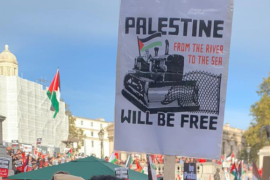The Guardian’s former Jerusalem correspondent Oliver Holmes returned to provide readers with an ‘explainer’ on the recent surge in violence. It wouldn’t surprise anyone who has followed our scrutiny of the reporter over the years that woven into the article is the usual elements of Guardian bias about the conflict: a denial of Palestinian agency, a callous disregard for Israeli suffering and the wholesale re-writing of history.
The piece (Explainer: Israel and Palestine: what has caused violence to flare up again?, Jan. 30) begins with intifada revisionism:
There is speculation that the region is on the brink of an intifada – a Palestinian uprising or, literally, a “shaking off” of Israeli control. The first two uprisings were cracked down on hard, failed to end the occupation and left several thousand people dead, mostly Palestinians.
It’s hard to overstate the degree to which Holmes airbrushed the Palestinian violence of the 2nd Intifada.
What he describes as a “shaking off” was a five year Palestinian campaign of often savage violence targeting Israeli civilians that left over 1,000 dead, with thousands more inured and maimed.
The fact that more Palestinians were killed during the conflict than Israelis doesn’t change the moral equation: that whereas most Palestinians killed during that period were unintended victims of IDF operations targeting terrorists, Israeli civilians, on the other hand, were the target of Palestinian attacks – including by suicide bombings, some which intentionally struck sites to maximize the number of children who’d be killed.
It’s as if Holmes went out of his way to erase the toll of the antisemitic terror campaign, that traumatic era in which Jews – because they were Jews – were hunted, targeted, and killed on buses, in restaurants, and at dance clubs.
Indeed, it’s stunning how Holmes’ take-away of the intifada is that “it failed to end the occupation”, while ignoring that Israeli efforts to end the occupation were rebuffed by Yasser Arafat in July 2000, two months prior to the outbreak of the 2nd Intifada, and again in January 2001, three months into the intifada.
In other words, not only did the violence of the Palestinian intifada (and the results of the Gaza disengagement) fail to ‘end the occupation’, it had the opposite effect: shattering Israeli dreams that peace was forthcoming, and was simply a matter of withdrawing from territory and offering Palestinians statehood.
Turning to more recent events, Holmes writes:
Israel launched one of its deadliest operations in years in the occupied West Bank on Thursday, sending soldiers on an unusually fierce raid to kill militants stationed in the Jenin refugee camp. Ten Palestinians, mostly gunmen, but also two civilians, including a 61-year-old woman, were killed.
…On Friday evening, a Palestinian gunman killed seven Israelis outside a synagogue in East Jerusalem. It was the deadliest Palestinian attack in the city in years.
Note how the Guardian reporter was careful to note that two Palestinian civilians were killed in the Jenin raid, yet he doesn’t mention that all of the Israelis killed on Friday were civilians – including a 14 year old boy.
Holmes then comments on the IDF’s ongoing anti-terror operation, named Operation Breakwater:
Breakwater, which focuses on Palestinian armed groups in Jenin and Nablus, has so far contributed to the highest death toll in Israel and the West Bank since the second intifada ended in 2005, with about 150 Palestinians and 30 Israelis killed in 2022.
As we’ve noted repeatedly in response to BBC’s misleading reporting on last year’s death toll, the majority of the Palestinians killed during 2022 were members of terrorist organisations and/or males involved in violent activities at the time, whereas the majority of the Israelis killed were civilians.
Holmes ends his explainer with this
Peaceful Palestinian attempts to end Israel’s occupation have been repeatedly and successfully suppressed, and many young people in the occupied territories believe the only alternative is to take up arms.
It’s normally quite easy to refute Guardian distortions about Israel. However, in this case, we honestly have no idea what Holmes is referring to. Which “peaceful…attempts to the end the occupation” have been tried by Palestinians, only to be “suppressed” by Israel?
Holmes seems to have allowed an entirely fictitious narrative – evoking the idea of otherwise peaceful Palestinians turning to terror as a last resort, because they have no other choice – to take the place of a fact-based, historically literate analysis of the conflict that imputes moral agency to both sides of the conflict.






Until the Guardian, BBC et al stop using the word gunman and replace it with terrorist, the reporting will always be false.
Facts about Israel do not matter for the Grauniad #journalismisdead